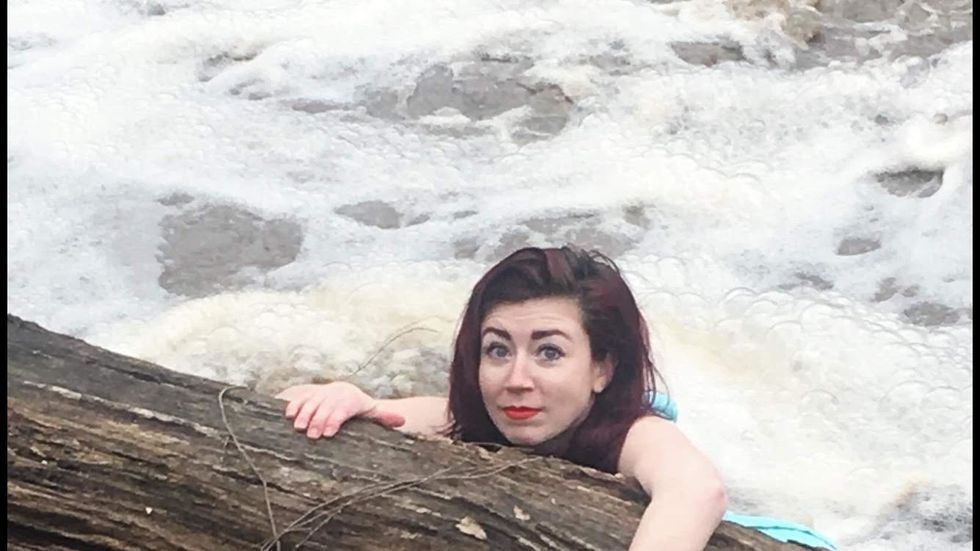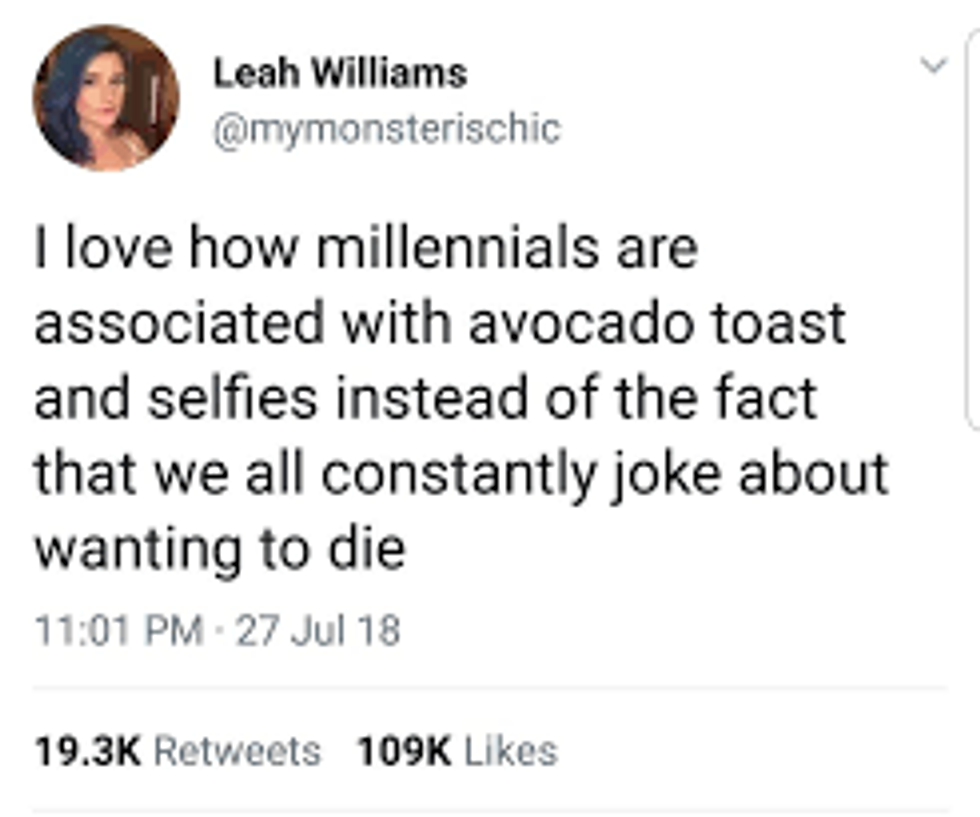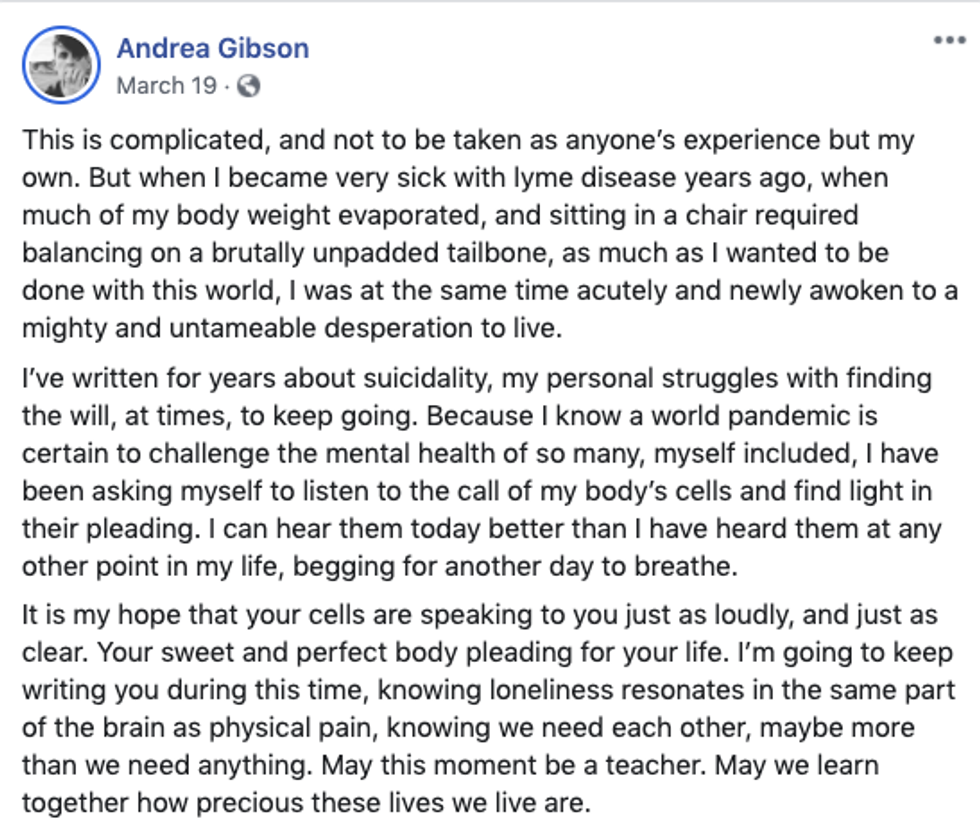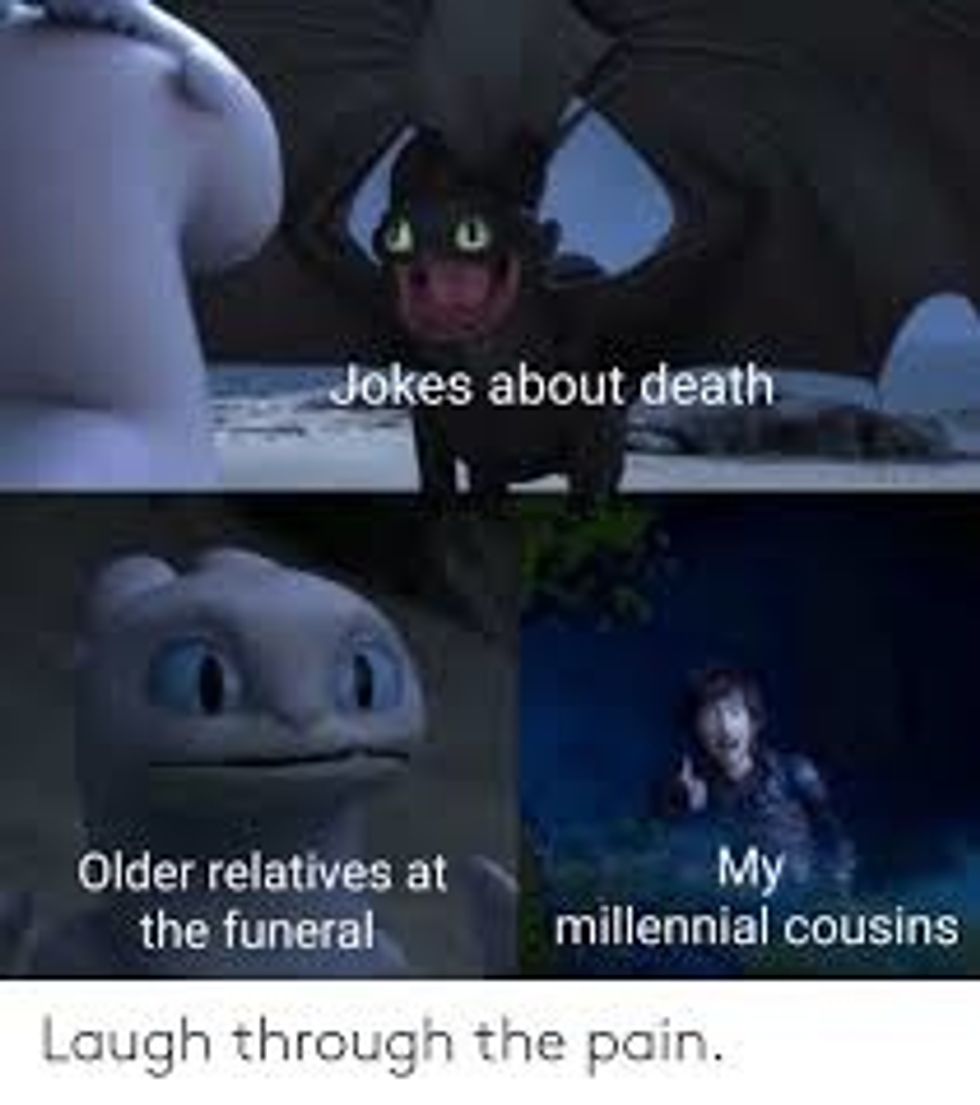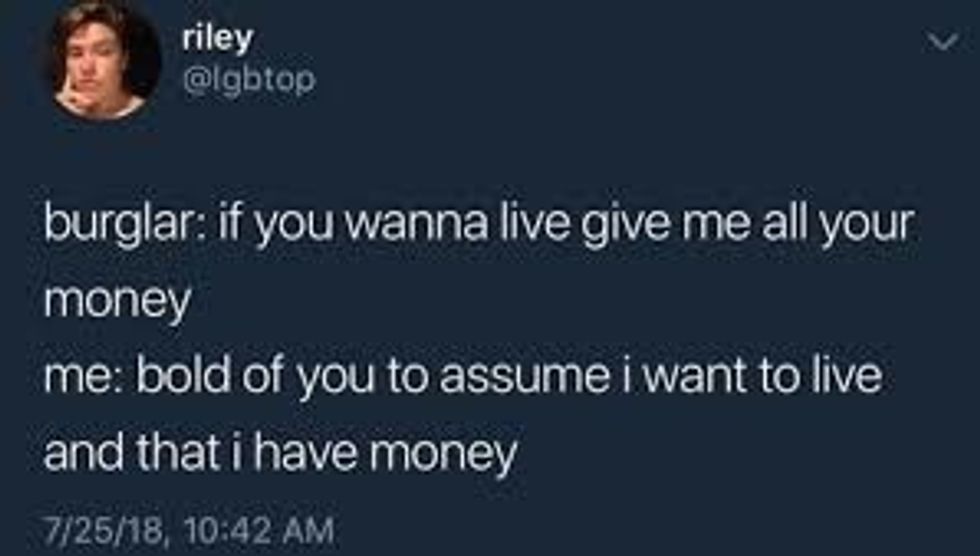It took COVID-19 to realize I actually want to be alive.
My friends and I laugh about "death ideation" or "getting murdered ideation": we don't want to kill ourselves, but we also kinda just want to die. Memes about how millennials completely embrace and look forward to their mortality make the rounds on Facebook daily.
Why do us millennials in general just want to die? The memes tell us this too: impending climate doom, significantly more school for jobs with significantly less pay, the crumbling of capitalism, crushing student loans, delayed once-important milestones like marriage/families/home ownership, failing healthcare, widespread loneliness, existential despair, the meaninglessness of life…You name it, we're probably struggling with it. And the best way we cope is to find a way to laugh about it. Is it gallows humor? Yes. Has joking about death counterintuitively kept us alive? Also yes.
My story bears similar aspects to many millennials who struggle with health. Dismissed by doctors, I lived with multiple unnamed autoimmune disorders for almost ten years before I was diagnosed. I'm almost always in discomfort, frequently in pain, and often ill. I'm a partner dancer and managing chronic injuries and illnesses severely impacts my life. Dancing is my life; it is almost exclusively my only social outlet; my dance community is my tribe. Dancing is one of the things that brings me the most joy. A life without dance feels like a life not worth living. And hey, when you're not that committed to life already, that doesn't seem like that big of a deal.
I needed no therapist to confirm my anxiety and depression over the state of the world and the state of my loved ones and the state of myself and my seeming inability to heal or fix any and all of it. When you're brimming with the (flawed) belief that your life doesn't really make a difference and you don't really matter (because you're not out there changing the world, or at least enough of it; "enough" always being some-number-larger than the one you're currently on), it's not that difficult to just throw up your hands and say "well fuck it I guess it doesn't matter if I'm here or not."
Realizing and accepting that I have health issues that will never get better and (au contraire) will only worsen with age feels impossible. Living feels like a constant battle. I enjoy life, but death sounds a lot easier and less painful, thanks.
A few days before COVID-19 hit Michigan, I was watching it spread like wildfire in California and fretting about my chronic respiratory issues and being immunosuppressed. Naturally this led to me joking about this with a friend (who also has similar health issues) and asking her if she was worried about the coronavirus. "Much to my dismay," she said wryly, "nothing I've gotten has killed me yet."
"Ugh," I responded—"that means the odds are that the coronavirus will just make things worse for us longterm, but not actually kill us! I'd rather it just kill me and get it over with!" I joked—and then realized: that was, shockingly to me, no longer true.
Really? I asked myself.
I've been following the CDC, WHO, and other sources since COVID-19 hit other countries and then ours. When the "high-risk" fatality brackets began rolling out percentages of approximately 6%* fatality for immune-suppressed folk and 8%* fatality for respiratory issues folk—those aren't percentages I want to gamble with. And even if I survived...we're seeing even healthy people without preexisting issues walking away from COVID-19 with longterm—maybe even permanent—lung damage. One source says it could be a 25% reduced capacity.
My lungs have scar tissue from bouts with pneumonia. I already function at reduced capacity. What if the 25% put me at a 50% reduced capacity? What if I couldn't even do vigorous activities or exercise, let alone dance?
But even if my quality of life was significantly reduced, I still want to live. Even if I lost more of my lung capacity, had to spend more massive amounts of time doing breath- and lung-training, was even more prone to respiratory infections and failures--even if I couldn't dance, I would still want to be here. To live. And to figure out how to be alive.
Andrea Gibson poignantly wrote:
My mind is still filled with anxiety and existential dread. I still mutter obscenities and pace the walls of my mind and have to fight constantly to believe my inconsequential life matters, especially during times like these. But when the voices in my head scream that I'm not enough and I might as well not be here—I push back. When they remind me that I'm only ever going to be in constant pain for the rest of my life and I might as well trade these flawed parts in now—I nod in acknowledgement, but I go further up and further in. When they tell me it's only going to get physically worse from here on in, and looking at the data they're not wrong—I whisper to myself that I don't need to believe things can get better, I just need to hope that I can believe that someday.
I'm still terrified about COVID-19. Don't let my courageous words fool you: I absolutely do not want to be forced to deal with more serious longterm health issues. I'm still struggling enough to accept the ones I already have. I can't imagine how I would cope if this affected my daily life, my job, my ability to dance.
And my odds are frightening: if I catch COVID-19, my lung issues alone virtually guarantee I will need a ventilator; if our hospitals are overrun and I can't get access, I will 100% die. That's just fatality rate. Not even "how likely are you to have lifelong health issues from this" rate.
I get that. My personal experience shows me how much a lifelong issue can fuck with your every day. And even with all that—I still hear each part of my sweet body, begging for another day to breathe, no matter the cost. When I feel the sun on my skin, I know that I want to feel it for a long time to come, despite future pain.
It's so dramatic and 4ish of me, that it took a worldwide pandemic with a virus whose hit-list I fit perfectly to help me realize I actually, deeply, want to stay alive.
I'll likely still make those classic millennial jokes about avocado toast and wanting to die. I still feel that streak of existential dread; unless we transform the way us humans treat each other and our world, it will likely never fully fade. My body isn't getting any younger, and daily pain will be an ever-present reminder of the fact that it'll only stop hurting when it's dead.
But COVID-19 made me realize how very much I'm happy to be alive, and I, at least, can be thankful for that.
*All these numbers keep changing as we get more data.

